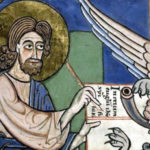We run our website the way we wished the whole internet worked: we provide high quality original content with no ads. We are funded solely by your direct support. Please consider supporting this project.

The Cross as a Trinitarian Event
On Calvary, the all-holy God fully identified with sinners, suffering the consequences of our sin as though he himself were guilty. While God is never culpable for the evil he allows, he nevertheless assumes responsibility for it by fully identifying with those free agents who are in fact culpable.
While the Son alone suffered as the “atoning sacrifice” for the sin of the whole world (1 Jn 2:2), the crucifixion was, in fact, a Trinitarian event. Indeed, some theologians have argued that the crucifixion is the ultimate foundation for the doctrine of the Trinity. The Trinity is the presupposition of revelation of God on the cross, but we have to reflect on the manner in which the entire Trinity was involved in the cross. This discloses the manner in which the entire Trinity assumes responsibility for all that comes to pass.
To begin, it was the love that all three Persons of the Trinity share for the lost world that led Jesus to offer himself up to violent agents, according to the will of the Father, through “the eternal Spirit” (Heb 9:14). In the words of Moltmann,
… what happened on the cross must be understood as an event between God and the Son of God. In the action of the Father in delivering up his Son to suffering and to a godless death, God was acting in himself. … God overcomes himself, God passes judgment on himself, God takes the judgment on the sin of man upon himself. He assigns to himself the fate that men should by rights endure. The cross of Jesus … therefore reveals a change in God, a stasis within the Godhead …[1]
The “stasis” that Moltmann believes took place within the Godhead when the Father abandoned the Son amounted to an actual enmity that divided the Father and the Son on the cross. However, I would argue that if God’s eternal nature is perfect, other-oriented love (1 Jn 4:8; cf., 3:16), then even the slightest interruption of this love would entail nothing less than the dissolution of God.
Let me propose an alternative. This impossible conclusion is avoided if we simply remember that all three Persons of the Trinity entered into this suffering out of the perfect love they have for humanity, which is reflective of the perfect love they eternally share with one another.
Hence, while the experience of love between the Father and Son was temporarily interrupted, the God-defining love that eternally unites them and that brought them to this horrific experience was not. Indeed, the act of God experiencing his own antithesis in the God-forsakenness of the cross now can be understood to be the supreme expression of the perfect love that unites them. And this is precisely why I argue that the cross is that revelation of God beyond which none greater can be conceived.
Once we make this slight, but nevertheless significant, modification of Moltmann’s view, we can wholeheartedly embrace his conclusion that the suffering involved in the Crucifixion involved the entire Trinity. “In the passion of the Son,” he writes, “the Father himself suffers the pains of abandonment. In the death of the Son, death comes upon God himself, and the Father suffers the death of his Son in his love for forsaken man.”[2]
God’s accommodating, sin-bearing activity reveals God’s eternal essence because in accommodating humanity’s limitations and failings, the triune God was not doing something that was foreign to Godself. To the contrary, the humble, other-oriented love that is revealed when God stoops to enter into solidarity with humans reflects, and participates in, the humble, other-oriented, self-giving love that is the eternal essence of the triune God.
Only if the cross is understood as a Trinitarian event can it be considered the unsurpassable revelation of God. The sin-bearing suffering of the Son perfectly reveals the triune God only because this suffering is shared by the triune God. If the Son alone suffered, his suffering would disclose nothing about the Father and Spirit. Indeed, if the Son alone suffered, it would call into question the authenticity of the love of the Father and Spirit for the Son, for how can the suffering of a beloved not produce equally intense suffering in the lover?
If we grant that all three divine Persons were in their own distinct ways involved in the suffering of the cross, and if we grant that this suffering was because the Son was assuming responsibility for the sin of the world, as though he was guilty of it, then it follows that all three divine Persons were, in their own way, suffering because they were also assuming responsibility for the sin of the world. Stated otherwise, the Son’s humble, other-oriented act of appearing as though he were guilty of committing crimes that he merely allowed reveals the triune God only because this act is shared, and suffered, by the Father and Spirit as well.
[1] Moltmann, The Crucified God, 192-3.
[2] Moltmann, ibid., 192.
Photo credit: August Brill via Visual hunt / CC BY
Category: General
Tags: Cross, Cruciform Theology, Jürgen Moltmann, Trinity
Topics: Attributes and Character, Trinity
Related Reading

Christus Victor Atonement and Girard’s Scapegoat Theory
Many of the major criticisms of Crucifixion of the Warrior God that have been raised since it was published four weeks ago have come from folks who advocate Rene Girard’s understanding of the atonement. A major place where these matters are being discussed is here, and you are free to join. Now, I have to…

Podcast: What Does it Mean for Jesus to Mediate for God if Jesus IS God?
Greg discusses what it means for each member of the Trinity to have different roles. http://traffic.libsyn.com/askgregboyd/Episode_0159.mp3

Did Yahweh Crush His Son?
Though Isaiah was probably referring to the nation of Israel as Yahweh’s “suffering servant” when these words were penned, the NT authors as well as other early church fathers interpreted this servant to be a prophetic reference to Christ. Speaking proleptically, Isaiah declares that this suffering servant was “punished” and “stricken by God” (Isa 53:4,…

Podcast: Why Does Peter Say Lot Was a Righteous Man?
Greg ponders the moral judgements of Lot by Peter in light of Lot’s treatment of his daughters. http://traffic.libsyn.com/askgregboyd/Episode_0302.mp3

Not the God You Were Expecting
Thomas Hawk via Compfight Micah J. Murray posted a reflection today titled The God Who Bleeds. In contrast to Mark Driscoll’s “Pride Fighter,” this God allowed himself to get beat up and killed while all his closest friends ran and hid and denied they even knew him. What kind of a God does this? The kind…

Jesus and the “Eye for an Eye” Command: A Response to Paul Copan (#10)
As I noted in my 9th response to Paul Copan’s critique of Crucifixion of the Warrior God (CWG), Copan argues that Jesus merely repudiated wrong applications of OT laws in his sermon on the mount, not any OT law itself. He thus thinks I’m mistaken when I argue that Jesus placed his own authority above…
